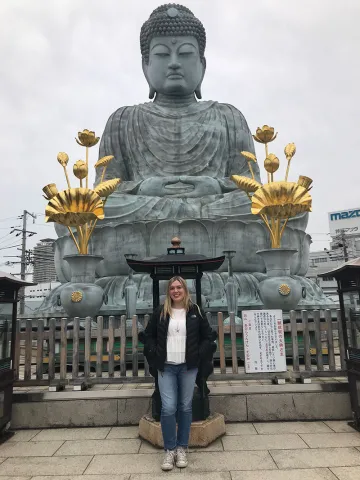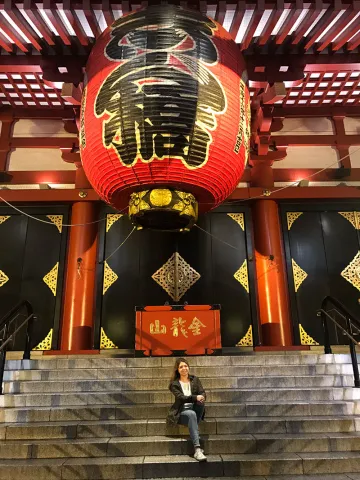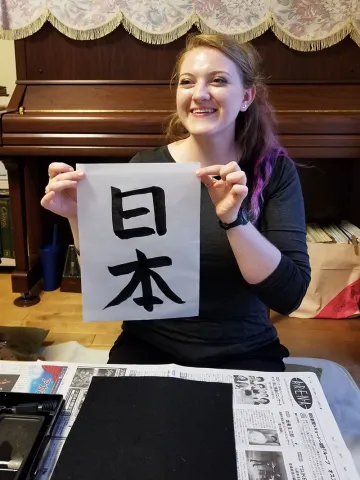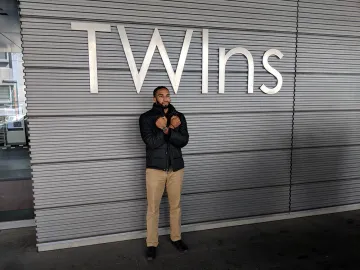Lessons from the Land of the Rising Sun: Entrepreneurship Students Explore Business Culture in Japan
Entrepreneurship students explore the business cultures of Japan

In February 2018, 22 Eller students, most of them honors students and all studying entrepreneurship, touched down at the Haneda Airport in Tokyo, Japan. Over the next seven days, they embarked on an exploration of the country’s business and culture as part of the Kakehashi Project, a highly selective program of the Japanese Ministry of Foreign Affairs aimed at promoting a better understanding of Japan and its people.

Alex Gibson '18 BSBA at the third-largest Buddha statue in Japan.
In addition to an opinion exchange forum with students from Waseda University—a prestigious, private research university in Tokyo’s bustling Shinjuku ward—the group was welcomed into a range of businesses across Tokyo, Kobe and Osaka: MOBIO, a business information center supporting local manufacturers; AOKI, an intentionally small business that manufactures airplane parts; Kobe Shu-shin-kan Breweries, a family-run sake brewery established in 1751; and global electronics giant Panasonic.
Eller was one of 11 U.S. schools selected for the 2018 program, following application to the program by Carlos Alsua, academic director and senior lecturer of international management and global entrepreneurship in Eller’s McGuire Center for Entrepreneurship. Alsua pursued the competitive opportunity as a way to make study abroad more accessible to high-performing entrepreneurship students, regardless of personal circumstances.
“Most of the business decisions we make have global ramifications, even if you’re just an entrepreneur with one small business,” explained Alsua, who accompanied students on the trip, along with Anne Stringfellow, senior lecturer in entrepreneurship and innovation. “How can we say we’re delivering a global education if we don’t expose them to the world? And even though this trip was only nine days, at the end of it, the world had opened up so much for these students.”

Juliana Provencio BSBA ’18 at Senso-ji, a temple in Tokyo.
That impact is easy to spot in the thoughts below from four students who participated in the trip.
- Alex Gibson ’18 BSBA (Entrepreneurship, Business Management and MIS)
- Juliana Provencio ’18 BSBA (Entrepreneurship, Business Management and Pre-medicine)
- Cassie Schickling ’18 BSBA (Marketing)
- Tripp Twyman ’18 BSBA (Entrepreneurship, Accounting and Finance)
Comparing Business Cultures
Gibson: For me, what stood out is that Japanese business people and business practices are very risk-averse. Also, that the Japanese [as employees] are more loyal to their companies, unlike Americans, who are more loyal to themselves and their career development.
Schickling: What stood out most to me were the similarities. Particularly when we visited AOKI. Visiting that company felt like visiting my dad at his work. Yes, the people and the policies were different, but the inventive spirit was just the same, and I could feel it all around.
Twyman: One thing that was striking to me was how much less emphasis the Japanese put on growth and profitability. When we talked to business people, their focus was on quality above all else. This meant some companies would stay small when they clearly had a business with the potential to grow significantly, if they wanted.

Cassie Schickling ’18 BSBA with her first calligraphy attempt, “Japan.”
Overall Standout Experience
Gibson: The highlight of the trip was definitely the homestay with the Japanese families. It was so fun to spend a couple of days with our family to learn more about the Japanese culture, see some cool sights (like the third-largest Buddha statue in Japan) and eat delicious, homemade Japanese food.
Provencio: I loved seeing how the Japanese chose to approach their way of life, including their politics, economics, community living and home life. They are a very humble, peaceful and giving culture, and I will always be touched by their concern for their environment and other people.
Schickling: Without a doubt, the highlight for me was the homestay. We could get lectures and tours all day long, but without understanding how an average person lived their daily life, I really couldn’t understand how some products and services were actually used.
Value of Travel in Education
Gibson: International travel shows you that your way is not the one and only way. Every country has their own approach, which they believe is best for doing business. International travel teaches you this fundamental lesson and will help you think of ways to meet each other in the middle when doing business in the future.

Tripp Twyman ’18 BSBA visits TWIns in Japan.
Schickling: I am a firm believer that a business education should prepare you with knowledge of the global system and an understanding that not every system is the same. Reading a textbook will never equal understanding, because understanding comes from interaction.
Twyman: International travel teaches you about cultural agility. Being taken out of the United States, we noticed a lot of things that we didn’t know could be different about the way we live our lives and operate in business. I think this improved ability to empathize with different perspectives will make us able to engage more meaningfully with our customers, partners and other stakeholders.
Header photo by Walkerssk, courtesy Pixabay.

